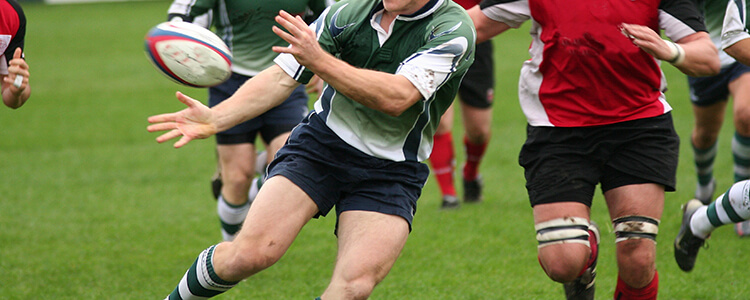As rugby fans around the world look forward to the start of the 2019 Rugby World Cup in Japan later this month, James, our resident Chiropractor, looks at the impact this much-loved support can have on the body, whether playing as an elite athlete or simply just for fun.
No matter at what level the sport is played, injuries for rugby players have become part and parcel of the game. A recent study at Bath University showed just how prevalent they are – for every 1000 hours of international rugby, there are 58 injuries, compared to 17 for football and just 2.8 for international cricket.
The fast-paced nature of the modern game and the forces that scrums and tackles put on the human body are immense, so it is no wonder that injuries are so prevalent. Did you know for example that the average force of a tackle is 166 Kg and this stress is passed through the entire body, down the neck right to the ankles. Whilst other muscular injuries can also often occur without the force of impact simply through running and kicking.
Categories of Injuries
As with other sports, rugby injuries can be classified into two categories – traumatic and overuse.
Traumatic
Traumatic injuries are usually the result of tackles or collisions with other players. They are often unavoidable and don’t only occur during matches with a considerable amount of injury occurring during training sessions.
They include concussion, ligament damage and fractures. These types of injuries can be reduced as players improve their techniques as well as by wearing suitable protective equipment such as gum shields, headgear and shoulder pads.
Overuse
Overuse injuries are those that build over time due to a specific action (normally a negative one) being repeated over and over again. The injury starts as a niggling pain but over time gets worse and more serious if left untreated. Shin Splints is a common example of this type of overuse injury.
Common Rugby Injuries
The most common rugby problems are groin or hamstring injuries, where the adductor and hamstring muscles are over-stretched. Whilst strain injuries vary, they are often painful and can result in swelling and bruising.
Rugby involves stopping, starting and changing direction rapidly. This applies a lot of stress on the knees and ankles and causes ligament strains, ruptures and tears.
The ACL (anterior cruciate ligament) and the PCL (posterior cruciate ligament) can be torn by sudden twisting of the knee joint, whilst the MCL (medial collateral ligament) can be injured as a result of twisting or decelerating or sudden impact.
These injuries can often require surgery if they are not responsive to other types of treatment such as Chiropractic or Physiotherapy.
Chiropractic Care for Rugby Injuries
Whether you are a professional rugby player or an amateur, it’s important that you look after your joints and mobility so that you are match fit. If you have shoulder, neck, or back pain or any of the above-mentioned problems, sustained as a result of playing rugby it is advisable to speak to a Chiropractor. They are highly trained and can gently manipulate the bones and muscles to alleviate the pain and help the body to heal itself.
Physiotherapy Care for Rugby Injuries
Physiotherapists can also provide hands-on treatment involving joint mobilisation and soft tissue work. They will discuss how the injury occurred and particularly in the case of overuse injuries, will work with you to address any postural, biomechanical or technique-related issues. If necessary, they will prescribe an exercise programme to help rehabilitation.
Prevention is Better than a Cure
Stretching before and after all sport is incredibly important and Rugby is no different, as it will help reduce injuries especially for muscles such as the groin and hamstrings.
Another way to prevent injuries is to identify which muscles and joints are weaker and take proactive action to protect them from injury. At Courtyard Clinic, the Chiropractic and Physio teams can help you do this with an initial 15 mins free assessment. They can then recommend ways you can address these issues with exercises to strengthen the area or help with any current injuries to prevent them from becoming more serious.
Give our team a call on 01666 714119 to arrange an appointment with one of our team.

